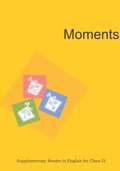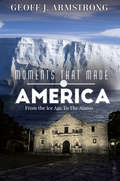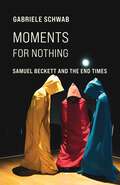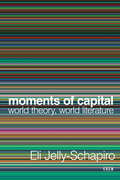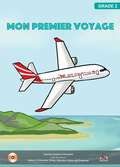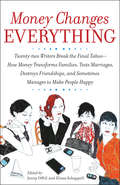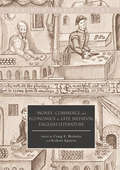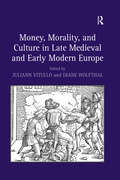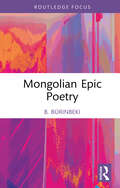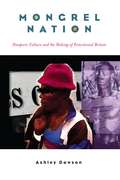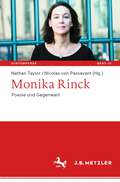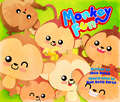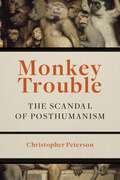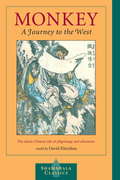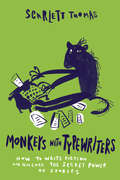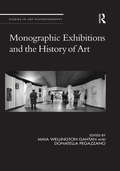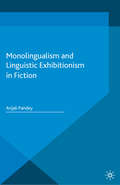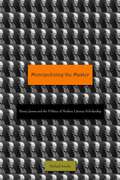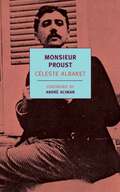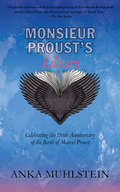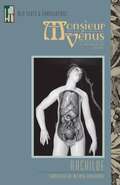- Table View
- List View
Moments Supplementary Reader class 9 - NCERT - 23
by National Council of Educational Research and Training"MOMENTS," a supplementary reader in English for Class IX by NCERT, intricately weaves together a tapestry of diverse narratives that explore the human condition. Through a collection of stories ranging from heartwarming to thought-provoking, the book delves into various themes such as friendship, resilience, and the complexities of human relationships. Each story is crafted with meticulous attention to detail, inviting readers to empathize with the characters and reflect on their own experiences. From the poignant tale of a boy's journey to self-discovery in "The Lost Child" to the inspiring narrative of courage and sacrifice in "The Beggar," the book offers a rich literary landscape that resonates with readers of all ages. Through its engaging storytelling and profound insights, "MOMENTS" captivates its audience, leaving a lasting impression long after the final page is turned.
Moments That Made America: From The Ice Age To The Alamo
by Geoff J. ArmstrongThere is something totally appropriate about the fact that North America, the continent that would someday contain the United States, was born in a cataclysm so violent, it ripped apart a gigantic super continent. A little more than two hundred million years ago, the continent we know as North America did not exist. From space, our planet looked nothing like earth of the 21st century. At that distant time in our planet’s history, all the continents that exist today were joined together into one giant landmass scientists call “Pangaea”. Then, on the 4th of July, 200,000,000 BCE (Before the Common Era) an immense earthquake hammered Pangaea. From the extreme northernmost point to the southern end, a deep fault in the earth split open and a huge chunk of Pangaea began to separate from the rest of the supercontinent. At first, the separation was only a few inches, but North America was born at that moment. A small piece of the scar from that cataclysm can be seen in a 20-mile line of cliffs called the Hudson River Palisades that run along the west side of the lower Hudson River near New York City.The date is highly imaginary of course. With no humans around to invent calendars, we can’t possibly know the exact date North America was born, but that date fits perfectly. This book focuses on all those incredible pivotal moments in all those thousands of years that followed that made North America and give the world the United States.
Moments for Nothing: Samuel Beckett and the End Times
by Gabriele SchwabSamuel Beckett’s work has entranced generations of readers with its portrayal of the end times. Beckett’s characters are preoccupied with death, and the specters of cataclysm and extinction overshadow their barren, bleak worlds. Yet somehow, they endure, experiencing surreal and often comic repetitions that seem at once to confront finitude and the infinite, up to the limits of existence.Gabriele Schwab draws on decades of close engagement with Beckett to explore how his work speaks to our current existential anxieties and fears. Interweaving critical analysis with personal reflections, she shows how Beckett’s writing provides unexpected resources for making sense of personal and planetary catastrophes. Moments for Nothing examines the ways Beckett’s works have taken on new meaning in an era of crises—climate change, environmental devastation, and the COVID-19 pandemic—that are defined by both paralyzing stasis and pervasive uncertainty. They also offer a bracing depiction of aging and the end of life, exploring loneliness, vulnerability, and decay. Beckett’s particular vision of the apocalypse and his sense of persistence, Schwab argues, help us understand our times and even, perhaps, provide sanctuary and solace.Moments for Nothing features insightful close readings of iconic works such as Endgame, Happy Days, and the trilogy, as well as lesser-known writings including the thirty-five-second play Breath, which Schwab reconsiders in light of the pandemic.
Moments of Capital: World Theory, World Literature (Currencies: New Thinking for Financial Times)
by Eli Jelly-SchapiroUndertaken at the interface of critical theory and world literature, Moments of Capital sets out to grasp the unity and heterogeneity of global capital in the postcolonial present. Eli Jelly-Schapiro argues that global capital is composed of three synchronous moments: primitive accumulation, expanded reproduction, and the "synthetic dispossession" facilitated by financialization and privatization. These moments correspond to distinct economic and political forms, and distinct strands of theory and fiction. Moments of Capital integrates various intellectual traditions—from multiple trajectories of Marxist thought, to Weberian inquiries into the "spirit" of capitalism, to anticolonial accounts of racial depredation—to reveal the concurrent interrelation of the three moments of capital. The book's literary readings, meanwhile, make vivid the uneven texture and experience of capitalist modernity at large. Analyzing formally and thematically diverse novels—works by Fiston Mwanza Mujila, Marlon James, Jennifer Egan, Eugene Lim, Rafael Chirbes, Neel Mukherjee, Rachel Kushner, and others—Jelly-Schapiro evinces the different patterns of feeling and consciousness that register, and hypothesize a way beyond, the contradictions of capital. This book develops a new conceptual key for the mapping of contemporary theory, world literature, and global capital itself.
Moments of Magical Realism in US Ethnic Literatures
by Lyn Di Iorio Sandín Richard PerezA collection of essays that explores magical realism as a momentary interruption of realism in US ethnic literature, showing how these moments of magic realism serve to memorialize, address, and redress traumatic ethnic histories.
Mommyblogs and the Changing Face of Motherhood
by May FriedmanMothers have consistently relied upon one another for guidance and support as they navigate the difficult world of parenting. For many women, the increasingly established online community of "mommyblogs" now provides a source of camaraderie and support that acknowledges both the work of mothering and the implications of its undertaking. Beyond their capacity to entertain, how have mommyblogs shifted our understanding of twenty-first-century motherhood?In examining the content of hundreds of mommyblogs, May Friedman considers the ways that online maternal life writing provides a front row seat to some of the most raw, offbeat, and engaging portraits of motherhood imaginable. Focusing on the composition of the "mamasphere" and on mommyblogs' emphasis on connection, Friedman reveals the changing face of contemporary motherhood - one less concerned with the proscriptions of what good mothers should do, and more invested in what diverse mothers have to say.
Mon Premier Voyage class 2 - MIE
by Kaviraj S. Peedoly"Mon Premier Voyage," écrit par Kaviraj S. Peedoly et illustré par William Rasoanaivo, est un livre géant captivant destiné aux élèves de deuxième année à l'île Maurice. L'histoire suit Jamel alors qu'il se prépare pour son tout premier voyage en avion vers Rodrigues pour les vacances, accompagné de ses parents. La narration met en lumière les émotions de Jamel lors de son voyage aérien, mélangeant excitation et appréhension, avant de rejoindre la famille de son cousin Kenzo. Le récit explore également la découverte du jardin potager de Kenzo, offrant une immersion enrichissante dans le plaisir du jardinage. Structuré en trois sessions, le livre encourage l'interaction en classe, incitant les élèves à partager leurs expériences personnelles sur les voyages, la vie en famille à l'étranger et le jardinage. En combinant lecture, discussions et activités créatives, cet ouvrage vise à renforcer la compréhension linguistique et les compétences d'expression des jeunes apprenants, tout en élargissant leur univers par le biais de récits accessibles et engageants.
Money Changes Everything: Twenty-Two Writers Tackle the Last Taboo with Tales of Sudden Windfalls, Staggering Debts, and Other Surprising Turns of Fortune
by Jenny Offill Elissa SchappellThe editors of The Friend Who Got Away are back with a new anthology that will do for money what they did for women’s friendships. Ours is a culture of confession, yet money remains a distinctly taboo subject for most Americans. In this riveting anthology, a host of celebrated writers explore the complicated role money has played in their lives, whether they’re hiding from creditors or hiding a trust fund. This collection will touch a nerve with anyone who’s ever been afraid to reveal their bank balance. In these wide-ranging personal essays, Daniel Handler, Walter Kirn, Jill McCorkle, Meera Nair, Henry Alford, Susan Choi, and other acclaimed authors write with startling candor about how money has strengthened or undermined their closest relationships. Isabel Rose talks about the trials and tribulations of dating as an heiress. Tony Serra explains what led him to take a forty-year vow of poverty. September 11 widow Marian Fontana illuminates the heartbreak and moral complexities of victim compensation. Jonathan Dee reveals the debt that nearly did him in. And in paired essays, Fred Leebron and his wife Katherine Rhett discuss the way fights over money have shaken their marriage to the core again and again. We talk openly about our romantic disasters and family dramas, our problems at work and our battles with addiction. But when it comes to what is or is not in our wallets, we remain determinedly mum. Until now, that is. Money Changes Everything is the first anthology of its kind—an unflinching and on-the-record collection of essays filled with entertaining and enlightening insights into why we spend, save, and steal. The pieces in Money Changes Everything range from the comic to the harrowing, yet they all reveal the complex, emotionally charged role money plays in our lives by shattering the wall of silence that has long surrounded this topic.
Money, Commerce, and Economics in Late Medieval English Literature (The New Middle Ages)
by Robert Epstein Craig E. BertoletThis is the first collection of essays dedicated to the topics of money and economics in the English literature of the late Middle Ages. These essays explore ways that late medieval economic thought informs contemporary English texts and apply modern modes of economic analysis to medieval literature. In so doing, they read the importance and influence of historical records of practices as aids to contextualizing these texts. They also apply recent modes of economic history as a means to understand the questions the texts ask about economics, trade, and money. Collectively, these papers argue that both medieval and modern economic thought are key to valuable historical contextualization of medieval literary texts, but that this criticism can be advanced only if we also recognize the specificity of the economic and social conditions of late-medieval England.
Money, Morality, and Culture in Late Medieval and Early Modern Europe
by Diane WolfthalOne of the first volumes to explore the intersection of economics, morality, and culture, this collection analyzes the role of the developing monetary economy in Western Europe from the twelfth to the seventeenth century. The contributors”scholars from the fields of history, literature, art history and musicology”investigate how money infiltrated every aspect of everyday life, modified notions of social identity, and encouraged debates about ethical uses of wealth. These essays investigate how the new symbolic system of money restructured religious practices, familial routines, sexual activities, gender roles, urban space, and the production of literature and art. They explore the complex ethical and theological discussions which developed because the role of money in everyday life and the accumulation of wealth seemed to contradict Christian ideals of poverty and charity, revealing a rich web of reactions to the tensions inherent in a predominately Christian, (neo)capitalist culture. Money, Morality, and Culture in Late Medieval and Early Modern Europe presents a comprehensive, multi-disciplinary assessment of the ways in which the rise of the monetary economy fundamentally affected morality and culture in Western Europe.
Mongolian Epic Poetry
by B. BürinbekiThe book studies Mongolian epic poetry on the basis of Mongolian texts and Western literary theory.The author presents a coherent aesthetic system of heroic epic, gives examples of the sacred, primitive, and paradigmatic characteristics of ancient Mongolian epic, and then shows how the exploits of heroes unfold in infinite time and space. He describes the divinity and humanity of the white heroes as an embodiment of their group spirit. Along with the black Mongol heroes, he presents their divinely wise steeds, prized by Mongol nomads, as the embodiment of a poetics of evil. In particular, the book explores the complex relationship between humans and nature in Mongolian epics and analyzes the influence of social change on the growth, development, and decline of epic. It also examines imagery, prosody, and style, focusing on lyrical factors and the formulaic units of epic composition.The book will be valuable to scholars and graduate students of Asian literature, folklore, and anthropology.
Mongrel Nation: Diasporic Culture and the Making of Postcolonial Britain
by Ashley DawsonMongrel Nation surveys the history of the United Kingdom's African, Asian, and Caribbean populations from 1948 to the present, working at the juncture of cultural studies, literary criticism, and postcolonial theory. Ashley Dawson argues that during the past fifty years Asian and black intellectuals from Sam Selvon to Zadie Smith have continually challenged the United Kingdom's exclusionary definitions of citizenship, using innovative forms of cultural expression to reconfigure definitions of belonging in the postcolonial age. By examining popular culture and exploring topics such as the nexus of race and gender, the growth of transnational politics, and the clash between first- and second-generation immigrants, Dawson broadens and enlivens the field of postcolonial studies.
Monika Rinck: Poesie und Gegenwart (Kontemporär. Schriften zur deutschsprachigen Gegenwartsliteratur #10)
by Nathan Taylor Nicolas Von PassavantAus Anlass ihrer Frankfurter Poetikvorlesungen erscheint der erste Sammelband über das Werk der Lyrikerin, Essayistin und Übersetzerin Monika Rinck. Die Aufsätze decken ein methodisch und thematisch breites Feld ab: von Close Readings bis zu subjekttheoretischen Fragestellungen, von Barockbezügen bis zur Analyse der Selbstpositionierung der Autorin im Feld der Gegenwartsliteraturen. Insbesondere geraten dabei die für die Autorin charakteristischen Grenzüberschreitungen zwischen Lyrik und Essay, zwischen poetischer Praxis und Lebensform in den Blick. Den Band rundet ein Gespräch mit der Autorin ab.
Monkey Fun! (Xist Children's Books)
by Julia DweckMonkey Fun! proves that you’re never too young to begin your learning adventure. It’s a barrel of fun and chock full of interesting monkey facts written in easy to understand rhyming verse for toddlers ages 0-4. “That’s not a monkey who’s peeling a grape. Bigger and tailless, he must be an ape.” “Monkeys who live in a family group, travel together and share with their troop.” Bold, colorful illustrations by Aida Barba Flores will capture the attention of young readers and aid in story comprehension. This is an edutaining rhyming adventure that offers fun learning resources in the back of the book including, Mrs. Dweck’s monkey facts and a monkey counting game.
Monkey Trouble: The Scandal of Posthumanism
by Christopher PetersonAccording to scholars of the nonhuman turn, the scandal of theory lies in its failure to decenter the human. The real scandal, however, is that we keep trying.The human has become a conspicuous blind spot for many theorists seeking to extend hospitality to animals, plants, and even insentient things. The displacement of the human is essential and urgent, yet given the humanist presumption that animals lack a number of allegedly unique human capacities, such as language, reason, and awareness of mortality, we ought to remain cautious about laying claim to any power to eradicate anthropocentrism altogether. Such a power risks becoming yet another self-accredited capacity thanks to which the human reaffirms its sovereignty through its supposed erasure.Monkey Trouble argues that the turn toward immanence in contemporary posthumanism promotes a cosmocracy that absolves one from engaging in those discriminatory decisions that condition hospitality as such. Engaging with recent theoretical developments in speculative realism and object-oriented ontology, as well as ape and parrot language studies, the book offers close readings of literary works by J.M. Coetzee, Charles Chesnutt, and Walt Whitman and films by Alfonso Cuarón and Lars von Trier.Anthropocentrism, Peterson argues, cannot be displaced through a logic of reversal that elevates immanence above transcendence, horizontality over verticality. This decentering must cultivate instead a human/nonhuman relationality that affirms the immanent transcendency spawned by our phantasmatic humanness.
Monkey: A Journey to the West
by David KherdianPart spiritual pilgrimage, part historical epic, the folk novel Journey to the West, which came to be known as Monkey, is the most popular classic of Asian literature. Originally written in the sixteenth century, it is the story of the adventures of the rogue-trickster Monkey and his encounters with a bizarre cast of characters as he travels to India with the Buddhist pilgrim Tripitaka in search of sacred scriptures. Much more than a picaresque adventure novel, Monkey is a profound allegory of the struggle that must occur before spiritual transformation is possible. David Kherdian's masterful telling brings this classic of Chinese literature to life in a way that is true to the scope and depth of the original.
Monkeys with Typewriters: How to Write Fiction and Unlock the Secret Power of Stories
by Scarlett ThomasExploring great plots from Plato to The Matrix, from Tolstoy to Toy Story, Scarlett Thomas’s new book is for writers and readers who want to unlock any narrative and create their own. Filled with creative exercises, structures, and charts, Thomas’ manual breaks down the fiction writing process and demonstrates that everyone has material to write about, whether they believe it or not. Have you ever had your heart broken, or broken someone else’s heart? Have you ever won an argument but later realized you were wrong? Have you ever tripped in public or spilled wine on someone else’s carpet? Monkeys with Typewriters is an ode to the secret power of stories, and a guide to cracking those powers open.As a bestselling author, Thomas may appear as a naturally gifted writer. However, for Thomas, fiction unlocked itself only once she recognized the importance of an author’s individual experience and one’s willingness to ask questions, not simply provide solutions. She deems the communication of one’s humanity as the key to making a piece relatable, and Thomas does nothing less in her own work. With startling and original insights into how we construct stories, Monkeys with Typewriters is a creative writing book like no other. It will show you how to not only write, but also to a finer degree, how to read.
Monographic Exhibitions and the History of Art (Studies in Art Historiography)
by Maia Wellington Gahtan Donatella PegazzanoThis edited collection traces the impact of monographic exhibitions on the discipline of art history from the first examples in the late eighteenth century through the present. Roughly falling into three genres (retrospectives of living artists, retrospectives of recently deceased artists, and monographic exhibitions of Old Masters), specialists examine examples of each genre within their social, cultural, political, and economic contexts. Exhbitions covered include Nathaniel Hone’s 1775 exhibition, the Holbein Exhibition of 1871, the Courbet retrospective of 1882, Titian's exhibition in Venice, Poussin's Louvre retrospective of 1960, and El Greco's anniversaty exhibitions of 2014.
Monolingualism and Linguistic Exhibitionism in Fiction
by Anjali PandeyHow are linguistic wars for global prominence literarily and linguistically inscribed in literature? This book focuses on the increasing presence of cosmetic multilingualism in prize-winning fiction, making a case for an emerging transparent-turn in which momentary multilingualism works in the service of long-term monolingualism.
Monopolizing the Master
by Michael AneskoHenry James defied posterity to disturb his bones: he was adamant that his legacy be based exclusively on his publications and that his private life and writings remain forever private. Despite this, almost immediately after his death in 1916 an intense struggle began among his family and his literary disciples to control his posthumous reputation, a struggle that was continued by later generations of critics and biographers. Monopolizing the Master gives a blow-by-blow account of this conflict, which aroused intense feelings of jealousy, suspicion, and proprietorship among those who claimed to be the just custodians of James's literary legacy. With an unprecedented amount of new evidence now available, Michael Anesko reveals the remarkable social, political, and sexual intrigue that inspired—and influenced—the deliberate construction of the Legend of the Master.
Monsieur Proust
by Barbara Bray André Aciman Céleste AlbaretCéleste Albaret was Marcel Proust's housekeeper in his last years, when he retreated from the world to devote himself to In Search of Lost Time. She could imitate his voice to perfection, and Proust himself said to her, "You know everything about me." Her reminiscences of her employer present an intimate picture of the daily life of a great writer who was also a deeply peculiar man, while Madame Albaret herself proves to be a shrewd and engaging companion.
Monsieur Proust's Library
by Anka MuhlsteinReading was so important to Marcel Proust that it sometimes seems he was unable to create a personage without a book in hand. Everybody in his work reads: servants and masters, children and parents, artists and physicians. The more sophisticated characters find it natural to speak in quotations. Proust made literary taste a means of defining personalities and gave literature an actual role to play in his novels. In this wonderfully entertaining book, scholar and biographer Anka Muhlstein, the author of Balzac's Omelette, draws out these themes in Proust's work and life, thus providing not only a friendly introduction to the momentous In Search of Lost Time, but also exciting highlights of some of the finest work in French literature.
Monsieur Vénus: A Materialist Novel (Texts and Translations #15)
by RachildeWhen the rich and well-connected Raoule de Vénérande becomes enamored of Jacques Silvert, a poor young man who makes artificial flowers for a living, she turns him into her mistress and eventually into her wife. Raoule's suitor, a cigar-smoking former hussar officer, becomes an accomplice in the complications that ensue.
